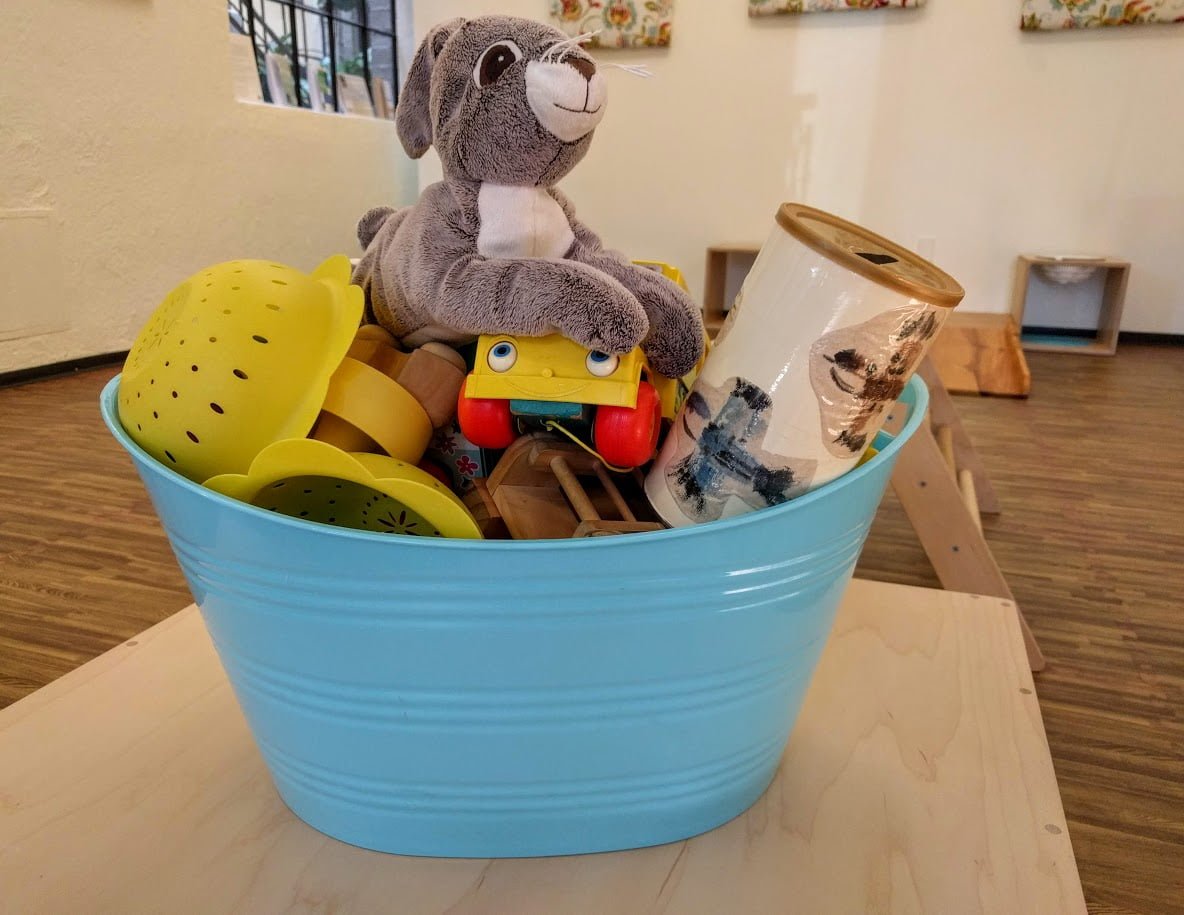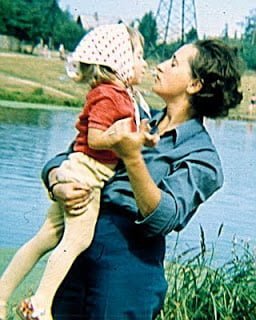When I worked in a preschool, the Clean Up Song was popular: teachers, parents, and children would sing it at the end of the day. I would sing it as well, thinking, “What a great way to encourage children to keep their classroom tidy.”
As a parent coach, I have received many requests from parents to help them teach their children to tidy up their rooms and pick up toys. Picking up toys and keeping them organized seems to be important to many parents and they feel frustrated when their children refuse to participate. On the surface, the Clean Up Song is a convenient way to entice children to do their chores.
Now I would like to invite you to my RIE® Parent-Infant Guidance™ class. Children often start the class when they are only a few months old. Let’s look at the process of cleaning up from a different angle.
Babies
When parents come to class with their babies, they slowly walk inside, taking their time to let the babies, as well as their parents, feel comfortable. Then they place their babies on the flat carpet covered with a clean sheet. There are a few simple toys around. Children get the opportunity for uninterrupted play while their parents observe them with soft eyes. Cleaning up is one of the few transitions that happen throughout the class. At the end of class, while I am still fully seated on the floor next to the babies, I will say something like: “In a minute, I will get up and bring the blue basket. We will collect our toys and then sing a few songs.” I pause and then get up and bring the blue basket. Slowly I will place the toys inside; some of the parents will do the same. Of course, no one is expecting the babies to participate in this activity, because they are still very young. Sometimes, parents are surprised that I tell the babies about the upcoming transition even though they seem not to care at all.
Why then do I do this?
Of course, the first time I share this information with the babies, it doesn’t mean much to them. Eventually, though, they will know exactly what I am saying – bringing the blue basket and putting the toys in it will become a routine. Routines play an essential role in our lives, giving us a sense of safety because we know what to expect. A cleaning-up routine will let babies know that class is about to end. When we use self-control to achieve a challenging task, we use a lot of energy; when we have a habit, we do not need to force ourselves to do the task. Routines help us develop self-discipline. Think about it — if we can turn necessary exercises in our life into a habit, how much energy will we save?
It will take many months before a baby will decide to model after grown-ups in picking up the first toy and placing it into the basket. This is the time when it is very tempting to encourage children to pick the toys up and be part of the cleanup activity. Sometimes parents even try to bring their baby with a toy in his/her hands to the basket. Some parents might start singing the old Clean Up Song. In this case, I would gently ask them to not do either of those, but instead, continue modeling by slowly picking up the toys. Occasionally I will ask a child close to the basket if he/she wants to put a ball in. And if the child is not interested, I will not mind at all. Research shows that children before school age who were “not forced to put away their toys after every play session will later be more inclined to do so.”
In the book, The Origins of Free Play the authors suggest that instead of making the cleanup activity an obligation and pressuring or convincing them to participate, “start by putting the toys away as a matter of course while requesting nothing of the child, and instead are glad if and when he helps us at it, he can experience the satisfaction and pleasure of the straightening up process as a joint undertaking.”
Parents often make comments: “We see that children love to clean up after RIE class!”
Yes, they are right that children love the Clean-Up activity in RIE class, because:
1. There are very few toys to pick up
2. Children know exactly what’s going on and when – it gives them security (and power in a way)
3. Children love the process of picking up items and carrying them to the basket
4. It’s fun to be part of a group activity
So, why do I discourage parents from singing the Clean Up Song? Well, I want us to be honest with children and help them create healthy habits. The Clean Up Song makes me feel like we’re being sneaky and dishonest with our children. In my opinion, the song is trying to “sugarcoat” an unpleasant activity, it’s almost as if we’re trying to trick them into cleaning up. In my mind, cleaning up does not have to be unpleasant and I don’t feel like I need to lure children into it. On the other hand, if it is a routine, there’s no longer a reason to trick them.
Email me or call for more information about RIE® Parent-Infant Guidance™ Classes.
Wishing you all the best in the difficult yet exciting journey of parenting!
Warmly,
Teacher Kira







